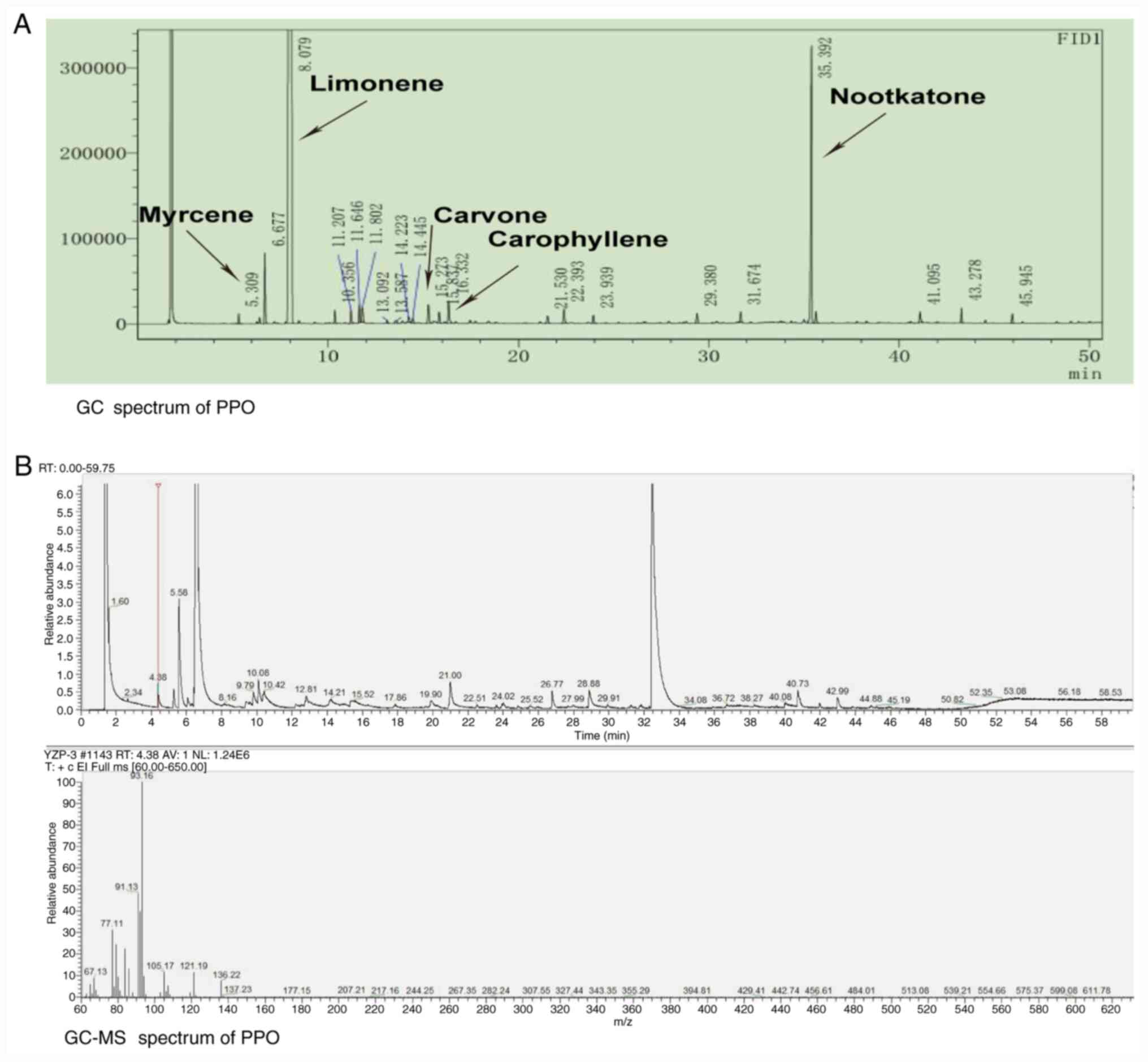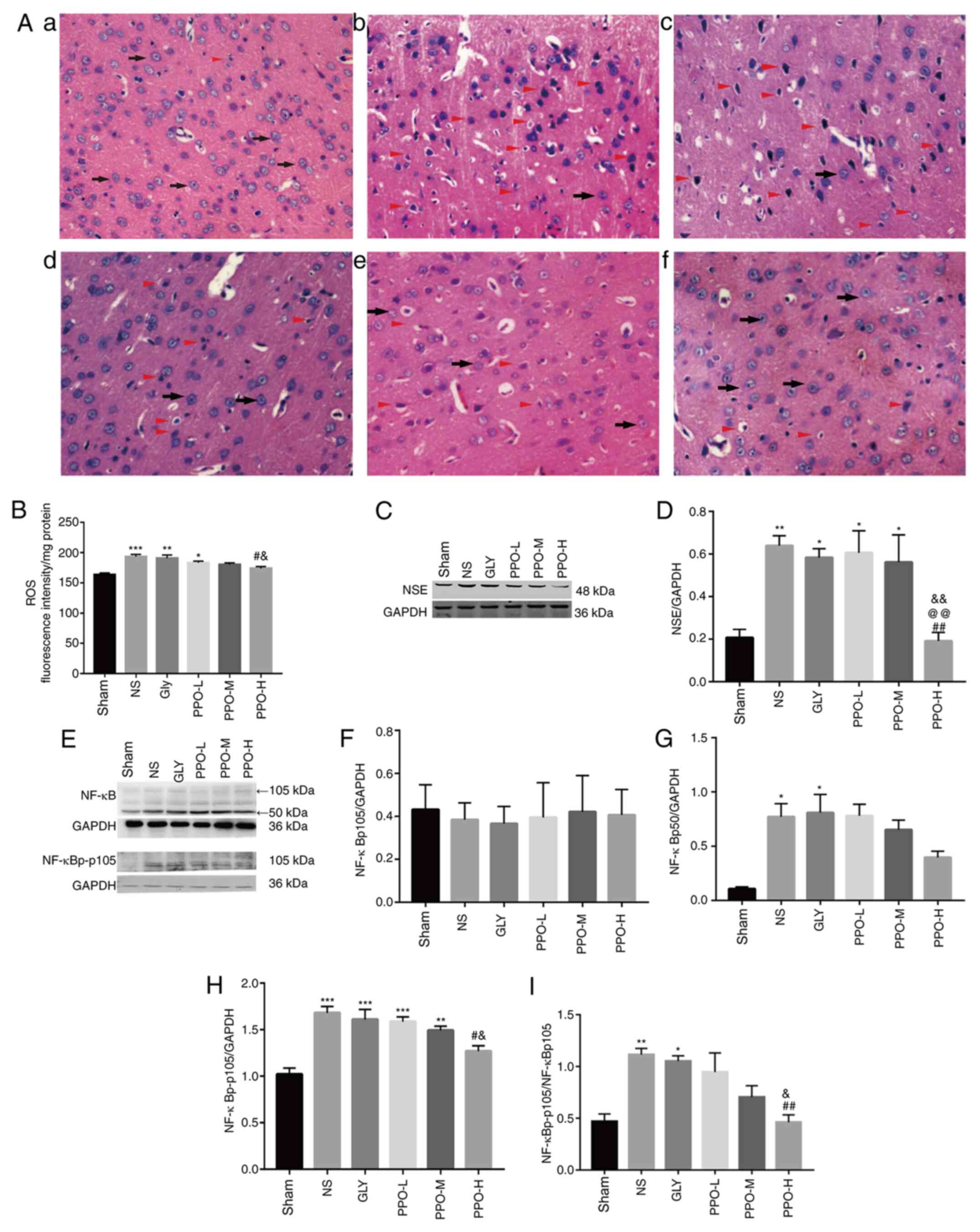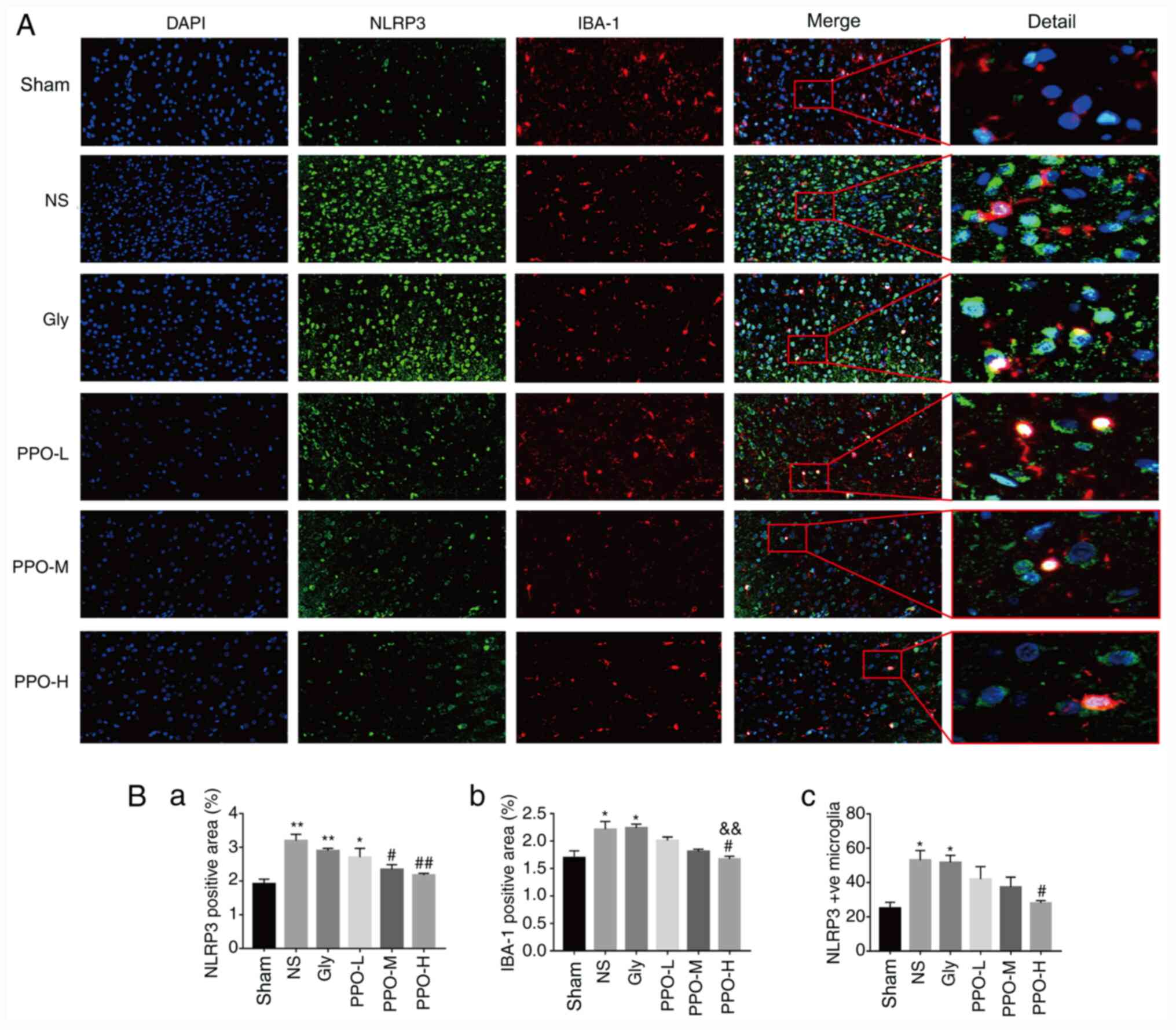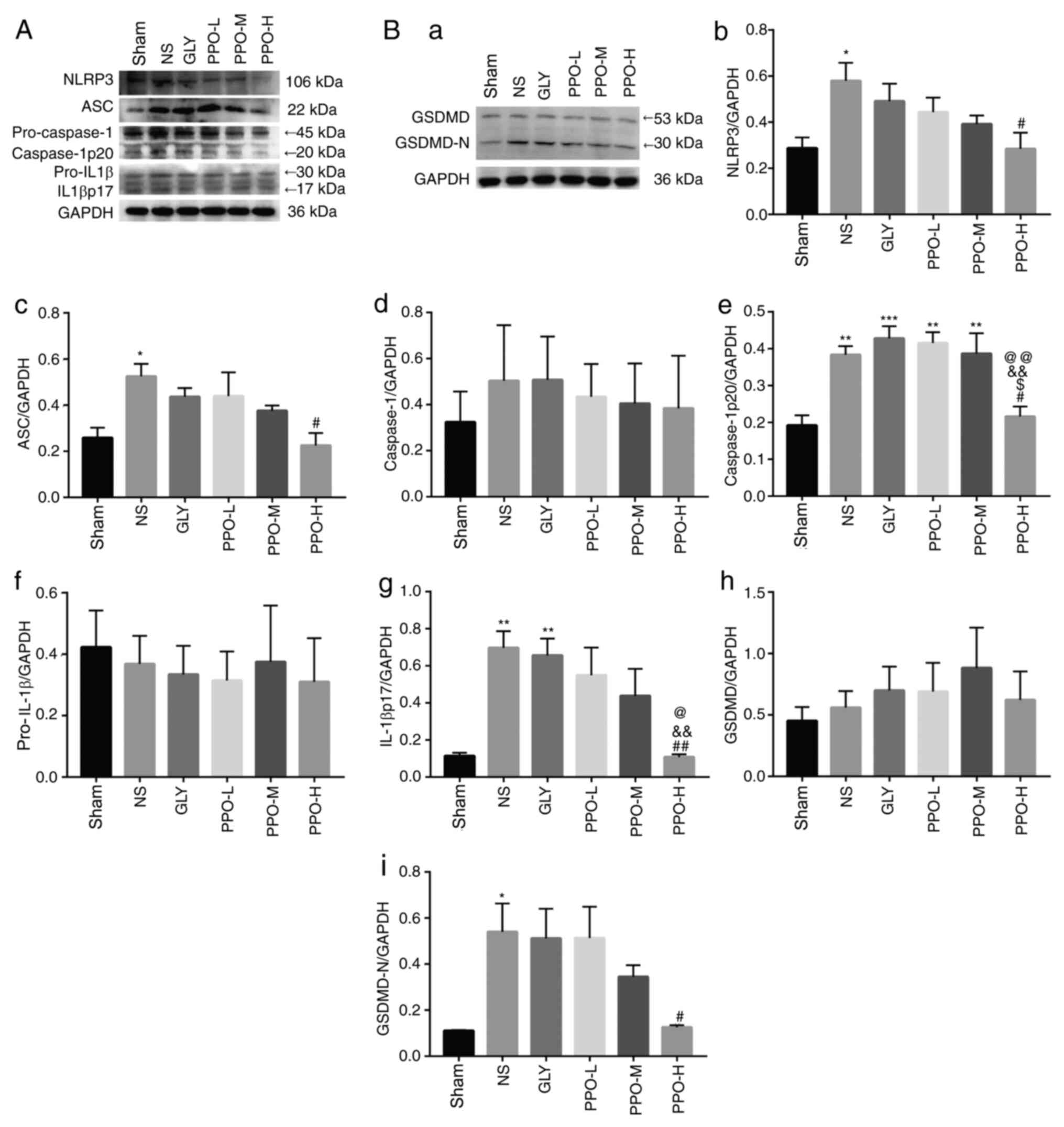|
1
|
He Q, Li Z, Wang Y, Hou Y, Li L and Zhao
J: Resveratrol alleviates cerebral ischemia/reperfusion injury in
rats by inhibiting NLRP3 inflammasome activation through
Sirt1-dependent autophagy induction. Int Immunopharmacol.
50:208–215. 2017.PubMed/NCBI View Article : Google Scholar
|
|
2
|
Chumboatong W, Thummayot S, Govitrapong P,
Tocharus C, Jittiwat J and Tocharus J: Neuroprotection of
agomelatine against cerebral ischemia/reperfusion injury through an
antiapoptotic pathway in rat. Neurochem Int. 102:114–122.
2017.PubMed/NCBI View Article : Google Scholar
|
|
3
|
Buckley KM, Hess DL, Sazonova IY,
Periyasamy-Thandavan S, Barrett JR, Kirks R, Grace H, Kondrikova G,
Johnson MH, Hess DC, et al: Rapamycin up-regulation of autophagy
reduces infarct size and improves outcomes in both permanent MCAL,
and embolic MCAO, murine models of stroke. Exp Transl Stroke Med.
6(8)2014.PubMed/NCBI View Article : Google Scholar
|
|
4
|
Ito M, Shichita T, Okada M, Komine R,
Noguchi Y, Yoshimura A and Morita R: Bruton's tyrosine kinase is
essential for NLRP3 inflammasome activation and contributes to
ischaemic brain injury. Nat Commun. 6(7360)2015.PubMed/NCBI View Article : Google Scholar
|
|
5
|
Bi F, Ma H, Ji C, Chang C, Liu W and Xie
K: Rhein protects against neurological deficits after traumatic
brain injury in mice via inhibiting neuronal pyroptosis. Front
Pharmacol. 11(564367)2020.PubMed/NCBI View Article : Google Scholar
|
|
6
|
Albornoz E, Woodruff T and Gordon R:
Inflammasomes in CNS diseases. Exp Suppl. 108:41–60.
2018.PubMed/NCBI View Article : Google Scholar
|
|
7
|
Shi J, Zhao Y, Wang K, Shi X, Wang Y,
Huang H, Zhuang Y, Cai T, Wang F and Shao F: Cleavage of GSDMD by
inflammatory caspases determines pyroptotic cell death. Nature.
526:660–665. 2015.PubMed/NCBI View Article : Google Scholar
|
|
8
|
Ding J, Wang K, Liu W, She Y, Sun Q, Shi
J, Sun H, Wang DC and Shao F: Pore-forming activity and structural
autoinhibition of the gasdermin family. Nature. 535:111–116.
2016.PubMed/NCBI View Article : Google Scholar
|
|
9
|
Fink SL and Cookson BT:
Caspase-1-dependent pore formation during pyroptosis leads to
osmotic lysis of infected host macrophages. Cell Microbiol.
8:1812–1825. 2006.PubMed/NCBI View Article : Google Scholar
|
|
10
|
Tsuchiya K and Hara H: The inflammasome
and its regulation. Crit Rev Immunol. 34:41–80. 2014.PubMed/NCBI View Article : Google Scholar
|
|
11
|
Agostini L, Martinon F, Burns K, McDermott
MF, Hawkins PN and Tschopp J: NALP3 forms an IL-1beta-processing
inflammasome with increased activity in Muckle-Wells
autoinflammatory disorder. Immunity. 20:319–325. 2004.PubMed/NCBI View Article : Google Scholar
|
|
12
|
Minutoli L, Puzzolo D, Rinaldi M, Irrera
N, Marini H, Arcoraci V, Bitto A, Crea G, Pisani A, Squadrito F, et
al: ROS-mediated NLRP3 inflammasome activation in brain, heart,
kidney, and testis ischemia/reperfusion injury. Oxid Med Cell
Longev. 2016(2183026)2016.PubMed/NCBI View Article : Google Scholar
|
|
13
|
Liu Y, Liu A, Ibrahim SA, Yang H and Huang
W: Isolation and characterization of microcrystalline cellulose
from pomelo peel. Int J Biol Macromo. 111:717–721. 2018.PubMed/NCBI View Article : Google Scholar
|
|
14
|
Aumeeruddy-Elalfi Z, Gurib-Fakim A and
Mahomoodally MF: Kinetic studies of tyrosinase inhibitory activity
of 19 essential oils extracted from endemic and exotic medicinal
plants. South Afr J Botany. 103:89–94. 2016.
|
|
15
|
Kim GS, Park HJ, Woo JH, Kim MK, Koh PO,
Min W, Ko YG, Kim CH, Won CK and Cho JH: Citrus aurantium
flavonoids inhibit adipogenesis through the Akt signaling pathway
in 3T3-L1 cells. BMC Complement Altern Med. 12(31)2012.PubMed/NCBI View Article : Google Scholar
|
|
16
|
Liu Y, Heying E and Tanumihardjo SA:
History, global distribution, and nutritional importance of citrus
fruits. Compre Rev Food Sci Food Safety. 11:530–545. 2012.
|
|
17
|
Mulero J, Bernabé J, Cerdá B,
García-Viguera C, Moreno DA, Albaladejo MD, Avilés F, Parra S,
Abellán J and Zafrilla P: Variations on cardiovascular risk factors
in metabolic syndrome after consume of a citrus-based juice. Clin
Nutr. 31:372–377. 2012.PubMed/NCBI View Article : Google Scholar
|
|
18
|
Hwang SL, Shih PH and Yen GC:
Neuroprotective effects of citrus flavonoids. J Agric Food Chem.
60:877–885. 2012.PubMed/NCBI View Article : Google Scholar
|
|
19
|
He W, Li X, Peng Y, He X and Pan S:
Anti-oxidant and anti-melanogenic properties of essential oil from
peel of pomelo cv. Guan Xi. Molecules. 24(242)2019.PubMed/NCBI View Article : Google Scholar
|
|
20
|
Hosni K, Zahed N, Chrif R, Abid I, MedfeiW
Kallel M, Kallel NB and Sebei H: Composition of peel essential oils
from four selected Tunisian Citrus species: Evidence for the
genotypic influence. Food Chemistry. 123:1098–1104. 2010.
|
|
21
|
Wu F, Jin Y, Xu X and Yang N:
Electrofluidic pretreatment for enhancing essential oil extraction
from citrus fruit peel waste. J Clean Prod. 159:85–94. 2017.
|
|
22
|
Zhao YL, Yang XW, Wu BF, Shang JH, Liu YP,
Zhi-Dai and Luo XD: Anti-inflammatory effect of Pomelo Peel
and its Bioactive Coumarins. J Agric Food Chem. 67:8810–8818.
2019.PubMed/NCBI View Article : Google Scholar
|
|
23
|
Fadel H, Marx F, El-Sawy A and El-Ghorab
A: Effect of extraction techniques on the chemical composition and
antioxidant activity of Eucalyptus camaldulensis var. brevirostris
leaf oils. Zeitschrift für Lebensmitteluntersuchung und -Forschung
A. 208:212–216. 1999.
|
|
24
|
National Research Council (US): Institute
for Laboratory Animal Research. Guide for the Care and Use of
Laboratory Animals. National Academies Press (US), Washington, DC,
1996.
|
|
25
|
Chen MH, Liu TW, Xie L, Song FQ, He T,
Zeng ZY and Mo SR: A simpler cardiac arrest model in rats. Am J
Emerg Med. 25:623–630. 2007.PubMed/NCBI View Article : Google Scholar
|
|
26
|
Abdel-Magied N, Shedid SM and Ahmed AG:
Mitigating effect of biotin against irradiation-induced cerebral
cortical and hippocampal damage in the rat brain tissue. Environ
Sci Pollut Res Int. 26:13441–13452. 2019.PubMed/NCBI View Article : Google Scholar
|
|
27
|
Cartwright T, Perkins ND and L Wilson C:
NFKB1: A suppressor of inflammation, ageing and cancer. FEBS J.
283:1812–1822. 2016.PubMed/NCBI View Article : Google Scholar
|
|
28
|
Ali MY, Rumpa NN, Paul S, Hossen MS,
Tanvir EM, Hossan T, Saha M, Alam N, Karim N, Khalil MI and Gan S:
Antioxidant potential, subacute toxicity, and beneficiary effects
of methanolic extract of pomelo (Citrus grandis L. Osbeck)
in long evan rats. J Toxicol. 2019(2529569)2019.PubMed/NCBI View Article : Google Scholar
|
|
29
|
Chen GW, Lin YH, Lin CH and Jen HC:
Antibacterial activity of emulsified pomelo (Citrus grandis
Osbeck) peel oil and water-soluble chitosan on Staphylococcus
aureus and Escherichia coli. Molecules. 23(840)2018.PubMed/NCBI View Article : Google Scholar
|
|
30
|
Koleva II, van Beek TA, Linssen JP, de
Groot A and Evstatieva LN: Screening of plant extracts for
antioxidant activity: A comparative study on three testing methods.
Phytochem Anal. 13:8–17. 2002.PubMed/NCBI View
Article : Google Scholar
|
|
31
|
Nguyen Thi PA, Chen MH, Li N, Zhuo XJ and
Xie L: PD98059 protects brain against cells death resulting from
ROS/ERK activation in a cardiac arrest rat model. Oxid Med Cell
Longev. 2016(3723762)2016.PubMed/NCBI View Article : Google Scholar
|
|
32
|
Liu D, Wang H, Zhang Y and Zhang Z:
Protective effects of chlorogenic acid on cerebral
ischemia/reperfusion injury rats by regulating oxidative
stress-related Nrf2 pathway. Drug Des Devel Ther. 14:51–60.
2020.PubMed/NCBI View Article : Google Scholar
|
|
33
|
Roberto D, Micucci P, Sebastian T,
Graciela F and Anesini C: Antioxidant activity of limonene on
normal murine lymphocytes relation to H2O2
modulation and cell proliferation. Basic Clin Pharmacol Toxicol.
106:38–44. 2010.PubMed/NCBI View Article : Google Scholar
|
|
34
|
Liao S, Wu J, Liu R, Wang S, Luo J, Yang
Y, Qin Y, Li T, Zheng X, Song J, et al: A novel compound DBZ
ameliorates neuroinflammation in LPS-stimulated microglia and
ischemic stroke rats: Role of Akt(Ser473)/GSK3beta(Ser9)-mediated
Nrf2 activation. Redox Biol. 36(101644)2020.PubMed/NCBI View Article : Google Scholar
|
|
35
|
Zhao J, Piao X, Wu Y, Liang S, Han F,
Liang Q, Shao S and Zhao D: Cepharanthine attenuates cerebral
ischemia/reperfusion injury by reducing NLRP3 inflammasome-induced
inflammation and oxidative stress via inhibiting 12/15-LOX
signaling. Biomed Pharmacother. 127(110151)2020.PubMed/NCBI View Article : Google Scholar
|
|
36
|
Swanson KV, Deng M and Ting JP: The NLRP3
inflammasome: Molecular activation and regulation to therapeutics.
Nat Rev Immunol. 19:477–489. 2019.PubMed/NCBI View Article : Google Scholar
|
|
37
|
Zhou R, Yazdi AS, Menu P and Tschopp J: A
role for mitochondria in NLRP3 inflammasome activation. Nature.
469:221–225. 2011.PubMed/NCBI View Article : Google Scholar
|
|
38
|
Dostert C, Pétrilli V, Van Bruggen R,
Steele C, Mossman BT and Tschopp J: Innate immune activation
through Nalp3 inflammasome sensing of asbestos and silica. Science.
320:674–677. 2008.PubMed/NCBI View Article : Google Scholar
|
|
39
|
Groslambert M and Py BF: Spotlight on the
NLRP3 inflammasome pathway. J Inflamm Res. 11:359–374.
2018.PubMed/NCBI View Article : Google Scholar
|
|
40
|
Nakahira K, Haspel JA, Rathinam VA, Lee
SJ, Dolinay T, Lam HC, Englert JA, Rabinovitch M, Cernadas M, Kim
HP, et al: Autophagy proteins regulate innate immune responses by
inhibiting the release of mitochondrial DNA mediated by the NALP3
inflammasome. Nat Immunol. 12:222–230. 2011.PubMed/NCBI View
Article : Google Scholar
|
|
41
|
Shimada K, Crother TR, Karlin J, Dagvadorj
J, Chiba N, Chen S, Ramanujan VK, Wolf AJ, Vergnes L, Ojcius DM, et
al: Oxidized mitochondrial DNA activates the NLRP3 inflammasome
during apoptosis. Immunity. 36:401–414. 2012.PubMed/NCBI View Article : Google Scholar
|
|
42
|
Parada E, Casas AI, Palomino-Antolin A,
Gómez-Rangel V, Rubio-Navarro A, Farré-Alins V, Narros-Fernandez P,
Guerrero-Hue M, Moreno JA, Rosa JM, et al: Early toll-like receptor
4 blockade reduces ROS and inflammation triggered by microglial
pro-inflammatory phenotype in rodent and human brain ischaemia
models. Br J Pharmacol. 176:2764–2779. 2019.PubMed/NCBI View Article : Google Scholar
|
|
43
|
Meng H, Zhao H, Cao X, Hao J, Zhang H, Liu
Y, Zhu MS, Fan L, Weng L, Qian L, et al: Double-negative T cells
remarkably promote neuroinflammation after ischemic stroke. Proc
Natl Acad Sci USA. 116:5558–5563. 2019.PubMed/NCBI View Article : Google Scholar
|
|
44
|
Chen L, Kong L, Wei X, Wang Y, Wang B,
Zhang X, Sun J and Liu H: β-arrestin 2 negatively regulates NOD2
signalling pathway through association with TRAF6 in microglia
after cerebral ischaemia/reperfusion injury. J Cell Mol Med.
23:3325–3335. 2019.PubMed/NCBI View Article : Google Scholar
|
|
45
|
Wang Y, Li SY, Shen S and Wang J:
Protecting neurons from cerebral ischemia/reperfusion injury via
nanoparticle-mediated delivery of an siRNA to inhibit microglial
neurotoxicity. Biomaterials. 161:95–105. 2018.PubMed/NCBI View Article : Google Scholar
|
|
46
|
Bauernfeind F, Bartok E, Rieger A, Franchi
L, Núñez G and Hornung V: Cutting edge: Reactive oxygen species
inhibitors block priming, but not activation, of the NLRP3
inflammasome. J Immunol. 187:613–617. 2011.PubMed/NCBI View Article : Google Scholar
|
|
47
|
Mandola AB, Sharfe N, Nagdi Z, Dadi H,
Vong L, Merico D, Ngan B, Reid B and Roifman CM: Combined
immunodeficiency caused by a novel homozygous NFKB1 mutation. J
Allergy Clin Immunol: Sep 25, 2020 (Epub ahead of print). doi:
10.1016/j.jaci.2020.08.040.
|
|
48
|
Yi H, Peng R, Zhang LY, Sun Y, Peng HM,
Liu HD, Yu LJ, Li AL, Zhang YJ, Jiang WH and Zhang Z:
LincRNA-Gm4419 knockdown ameliorates NF-κB/NLRP3
inflammasome-mediated inflammation in diabetic nephropathy. Cell
Death Dis. 8(e2583)2017.PubMed/NCBI View Article : Google Scholar
|
|
49
|
Chen J, Yang C, Xu X, Yang Y and Xu B: The
effect of focal cerebral ischemia-reperfusion injury on TLR4 and
NF-κB signaling pathway. Exp Ther Med. 15:897–903. 2018.PubMed/NCBI View Article : Google Scholar
|


















